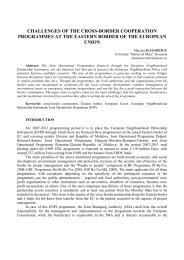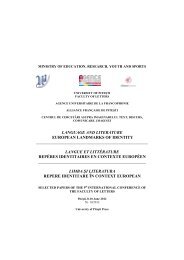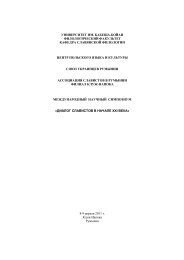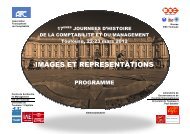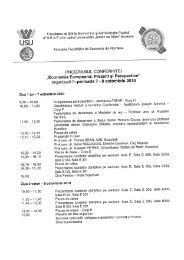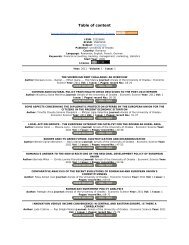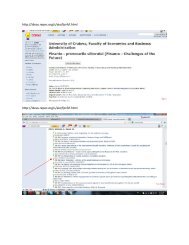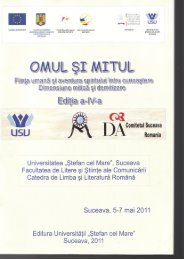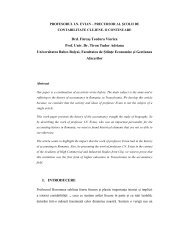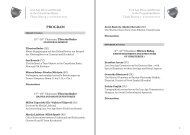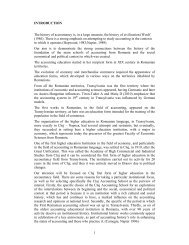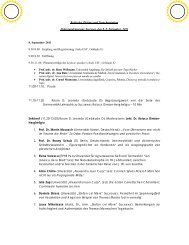Hume on miracles and the Lourdes phenomenon Alexandru Anghel
Hume on miracles and the Lourdes phenomenon Alexandru Anghel
Hume on miracles and the Lourdes phenomenon Alexandru Anghel
Create successful ePaper yourself
Turn your PDF publications into a flip-book with our unique Google optimized e-Paper software.
with too violent asseverati<strong>on</strong>s” etc. Therefore (from 3 <strong>and</strong> 4) when testim<strong>on</strong>y is given which is<br />
c<strong>on</strong>trary to our invariable experience, a probability, whe<strong>the</strong>r str<strong>on</strong>g or weak, is opposing a<br />
certainty <strong>and</strong> (from 1 <strong>and</strong> 2) <strong>the</strong> wise man will believe <strong>the</strong> certainty.<br />
With this summary <strong>and</strong> my explanati<strong>on</strong> in mind, I will quote <str<strong>on</strong>g>Hume</str<strong>on</strong>g> at length to establish<br />
<strong>the</strong> explanati<strong>on</strong> given above <strong>and</strong> to discuss fur<strong>the</strong>r <strong>the</strong> ideas he introduces:<br />
But in order to increase <strong>the</strong> probability against <strong>the</strong> testim<strong>on</strong>y of witnesses, let us suppose,<br />
that <strong>the</strong> fact, which <strong>the</strong>y affirm, instead of being <strong>on</strong>ly marvellous, is really miraculous; <strong>and</strong><br />
suppose also, that <strong>the</strong> testim<strong>on</strong>y c<strong>on</strong>sidered apart <strong>and</strong> in itself, amounts to an entire proof; in<br />
that case, <strong>the</strong>re is proof against proof, of which <strong>the</strong> str<strong>on</strong>gest must prevail, but still with a<br />
diminuti<strong>on</strong> of its force, in proporti<strong>on</strong> to that of its antag<strong>on</strong>ist. A miracle is a violati<strong>on</strong> of <strong>the</strong><br />
laws of nature; <strong>and</strong> as a firm <strong>and</strong> unalterable experience has established <strong>the</strong>se laws, <strong>the</strong> proof<br />
against a miracle, from <strong>the</strong> very nature of <strong>the</strong> fact, is as entire as any argument from experience<br />
can possibly be imagined. . . . There must, <strong>the</strong>refore, be a uniform experience against every<br />
miraculous event, o<strong>the</strong>rwise <strong>the</strong> event would not merit that appellati<strong>on</strong>. And as a uniform<br />
experience amounts to a proof, <strong>the</strong>re is here a direct <strong>and</strong> full proof, from <strong>the</strong> nature of <strong>the</strong> fact,<br />
against <strong>the</strong> existence of any miracle; nor can such a proof be destroyed, or <strong>the</strong> miracle rendered<br />
credible, but by an opposite proof, which is superior. The plain c<strong>on</strong>sequence is (<strong>and</strong> it is a<br />
general maxim worthy of our attenti<strong>on</strong>),‘That no testim<strong>on</strong>y is sufficient to establish a miracle,<br />
unless <strong>the</strong> testim<strong>on</strong>y be of such a kind, that its falsehood would be more miraculous, than <strong>the</strong><br />
fact, which it endeavours to establish: And even in that case <strong>the</strong>re is a mutual destructi<strong>on</strong> of<br />
arguments, <strong>and</strong> <strong>the</strong> superior <strong>on</strong>ly gives us an assurance suitable to that degree of force, which<br />
remains, after deducting <strong>the</strong> inferior.’” (<str<strong>on</strong>g>Hume</str<strong>on</strong>g>, [1748]2007:114-116; emphasis added)<br />
A very important progress in <str<strong>on</strong>g>Hume</str<strong>on</strong>g>’s argument is represented by <strong>the</strong> last propositi<strong>on</strong> I<br />
emphasized in <strong>the</strong> above quote: “No testim<strong>on</strong>y is sufficient to establish a miracle, unless <strong>the</strong><br />
testim<strong>on</strong>y be of such a kind, that its falsehood would be more miraculous, than <strong>the</strong> fact, which it<br />
endeavours to establish”. The point is that a testim<strong>on</strong>y which reports a miracle must be supported<br />
by an even str<strong>on</strong>ger proof than that of <strong>the</strong> law which <strong>the</strong> presumed miracle violates. This<br />
situati<strong>on</strong> arises from <strong>the</strong> fact that <str<strong>on</strong>g>Hume</str<strong>on</strong>g> c<strong>on</strong>siders that <strong>the</strong> testim<strong>on</strong>y, by itself, amounts to a<br />
proof. In o<strong>the</strong>r words, if we take <strong>the</strong> testim<strong>on</strong>y of <strong>the</strong> Old Testament, we will have to ask<br />
ourselves: What is more probable, that <strong>the</strong> events reported in <strong>the</strong> Old Testament are true or that<br />
<strong>the</strong> people who reported <strong>the</strong>m are susceptible to mistake or misinterpretati<strong>on</strong>? If <strong>the</strong> probability



